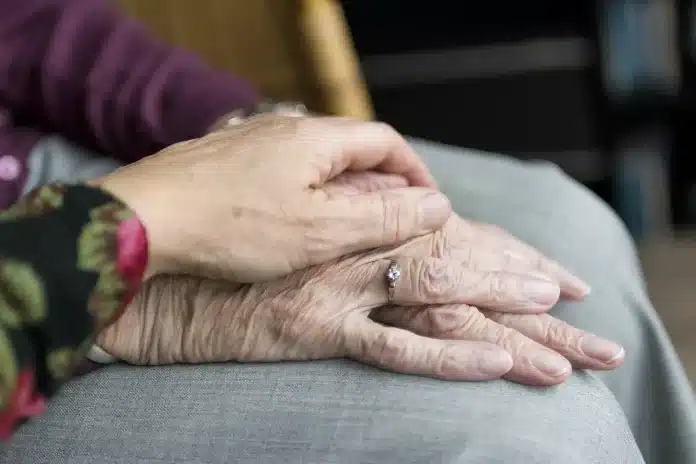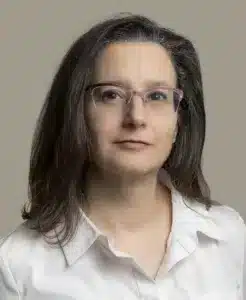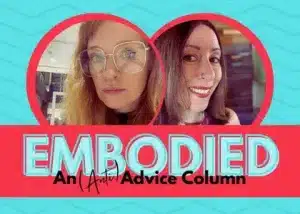In February 2019, two days after my son’s bar mitzvah, my mother was diagnosed with stage four ovarian cancer. A year later, in March 2020, she left her house for the last time on her own two feet to attend my daughter’s bat mitzvah. Four months later, she died.
The progression seems straightforward: diagnosis, illness, death. But that doesn’t factor in seventeen months of treatment, surgery, emergency room visits, and the emotional impact of dealing with the disease. There is nothing simple about watching the person you love most in the world endure chemotherapy and their slow withdrawal from society. There is nothing simple about watching the person who gave you life die.
Eva Evelyn Ellis married Philip Sonny Matlin at the age of eighteen, had her first child at nineteen and two more by the time she was twenty-five. I came along six years later. Despite marrying into my father’s upper-class family, she remained down-to-earth and kept the frugal mindset of someone raised among modest means during the post-war years, even though her own father later found success as a tailor.
Eva, who went by Evelyn, or Evy, her entire adult life, was an excellent mother, filled with a kind of patience that as a teen I assumed was magically bestowed upon you when you had children. She was even-tempered, warm, and intelligent, with a wicked sense of humour and an armory of solid advice. It didn’t matter what kind of trouble my siblings got into, I rarely saw her lose her cool. She dealt with things calmly, never raising her voice. She was nurturing and loved to laugh. She appreciated a good joke and would sometimes surprise me with one of her own. During one of her many ER visits, a doctor told an offensive riddle (“What’s the difference between a bull and woman with PMS? Lipstick.”) and my mother, half-conscious and fevered, snapped back, “What’s similar about men and tile floors? Lay them right the first time and you can walk all over them for the rest of your life.”
But mostly, when I try to conjure up an image of my mother, I see her lying on the left side of the double bed she shared with my father for sixty-two years, a box of drugstore chocolates on her lap, beckoning me to join her so we could either watch TV together or she could listen to my latest drama.
On top of being a mother to four, she obtained a university degree in her thirties, returned to school to get certified as a forensic document examiner, then ran her own business while helping my father run his. And she did it all with seeming ease and a quiet grace.
It seems incredible, and it was, but unbeknownst to me at the time, she sacrificed large parts of herself to do it. She strove to be the ideal wife and mother then harboured some serious regrets about it. An unintentional result of her actions was setting an extraordinarily high bar for her children. It was implicitly understood that we, her children, were meant to behave in a certain way.
As warm and patient as she was, my mother could also be judgmental. She had a strict no smoking or drug policy, was never shy to remark on someone’s weight, and had zero tolerance when people did things she disagreed with–even when it had nothing to do with her. She once came close to ending a lifelong friendship because she disapproved of her friend’s choice of partner. For a teenager growing up in her home, all of this felt restrictive, an impediment to getting into the kind of trouble I was supposed to get into at that age.
As a result, I developed a dual personality early in life. There was the person I was, and then the person I was with my mother. I hid the parts of me I thought might disappoint her, like my much older friends, my mild promiscuity, and my experimentation with drugs and alcohol. Once, in eighth grade, my best friend’s mother found half a joint in the toilet and called a meeting for all our parents. We were a gang of five girls and my mother sat with the other mothers and listened in disbelief to what we’d been up to. She could not fathom that I would have had any part in it, to the point she stood up and said, “Julie doesn’t do any of those things.”
The joint wasn’t even ours–it belonged to my friend’s brother. But it gathered all those parents in one room to exchange stories, which succeeded in shattering the illusion of the perfect daughter for my mother. When she got home that night, the look on her face and the quiet disapproval was enough for me to quit smoking cigarettes on the spot. I told my friends I did it on a bet, but the truth was, I couldn’t bear having that mark against me in my mother’s book. (Although there was a bet, and I won ten bucks.) The irony isn’t lost on me that in her attempt to model a certain behaviour, I ended up emulating the wrong one. Instead of becoming the person she tried to present, I developed her habit of splitting myself in two.
Years ago, one of my siblings tried explaining to me that my mother wasn’t the perfect being I thought she was. The theory was that our mother lived in a state of conflict, torn between who she was and who she thought she should be. I couldn’t see it at the time. I saw my mother through a lens coloured with love and tinged with worship. It was only after her death that the pieces fell into place, and by that time, it was too late.
Seventeen months passed in the blink of an eye, despite spending several eternities in hospital waiting rooms. Knowing our time would be short, I assumed the role of primary caregiver. I wanted to spend every second possible with her. I lived and breathed doctors appointments, chemo sessions, blood tests, and runs to Walmart to ensure a steady supply of Ensure. My own well-being fell by the wayside as I abandoned home-cooked meals for the McDonalds drive-thru, developing a cheeseburger habit I still can’t kick to this day.
Life at home suffered. My daughter’s grades fell and I wasn’t there for my son, who was taking his bubby’s illness almost as hard as I was. So many times he reached out to me, coming down past midnight seeking comfort, and all I could do was cry along with him.
My mother landed in palliative care in June 2020, at the height of the first pandemic lockdown. Only four of us were allowed to visit her, and only two at a time. We were required to get into full gear–gowns, masks, face shields, latex gloves–and not allowed to touch her. I was there every day, save one, and over the course of less than two weeks, her decline was fast, stark, and cruel.
The last day I saw her, I knew she wasn’t going to see morning. She had stopped eating and was on oxygen, but clearly she’d had a stroke in the night. She could no longer speak or move, and when the nurse came in to try to adjust her pillow, she winced in pain.
I stayed longer that day, from early morning until past dinnertime. I held her hand and played her favourite music. I read her notes that people had sent for her. I recited a few of her favourite Sedaris essays, read from the book I was adapting into a screenplay, and rued that I hadn’t brought along any Chaucer, her favourite (“The lyf so short, the craft so long to lerne.”).
Before I left, I stopped at the side of her bed. All my life, there was always a place for me in my mother’s bed. Even in my forties, when she was home between chemo sessions, we’d lie there and watch Judge Judy. There was nothing I wanted in that moment more than to be able to climb in with her one last time, to seek comfort from the woman who always provided it so freely and with such skill. I wanted to cradle myself in the curve of her body, feel her arm come down around me and pull me in close, her chin resting on the top of my head. Be safe in that place where nothing else could touch me.
But it was just a fantasy. There was no way I could get in there without causing her enormous pain. The tables had irrevocably turned. It was no longer her job to comfort me, but mine to comfort her.
We never had an end of life conversation, but at that moment, I looked down at her and said, “Don’t worry, Mummy. We’re going to be fine. I’m going to be fine. And I am going to do great things. I promise you will be so proud of me.”
Two years later, I cringe to think that in my last moments with her I was still desperate for her approval. That instead of my being there being enough, I qualified myself and told her that I would make her proud. While it’s normal for a child to seek their parent’s approval, this was something I never outgrew. I used to ask, “Are you proud of me?” so often it became a family joke. Every accomplishment punctuated by a “We’re so proud,” every birthday card signed the same way.
Today, diagnosed and medicated, I can recognize that desperation as early manifestations of my anxiety, but what did we know from anxiety in the seventies and eighties? And by the time the nineties rolled around, the whole routine was already inscribed in our family DNA.
I never understood how deeply this affected the relationship I had with my mother; that because I never felt I was enough, I was chasing after her love and approval. Now, it’s so clear to me that I didn’t have to do anything to earn it. I simply had to be. I, as her daughter, was enough. It haunts me that I failed to grasp this during her lifetime, but at the same time, I’m angry that she was unable to show me that she was fallible, too. That she had made mistakes and had regrets and was human just like all of us. Just like I was.
Now I find myself in the painful position of having to tease apart the love I felt for her from the extraordinary weight of it. I have to own the perverse sense of relief I felt when she died, the knowledge that I was free to just be me, without fear of disappointing anyone.
***
Our friends at Circe have launched an anti-advice column, and it is fire!
Click above to get details on how to ask Gina and Emily for advice and let us know what you think!
***



Thank you for sharing your very personal and superbly written journey, Julie, about your own self-evolution and for others to gain valuable insights from.
Thank you, too, for sharing such a deeply touching tribute to your beloved mother, Evy, and for recognizing your own true unconditional value. For what it may be worth… I can assure you that, whenever I visited your parents in their treasure of a store over so many years, your mother was so very genuinely proud of you for the person that you were (and are). In fact, she deservedly kvelled!
With good thoughts and good wishes,
Jonathan